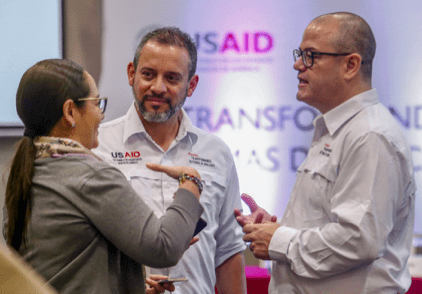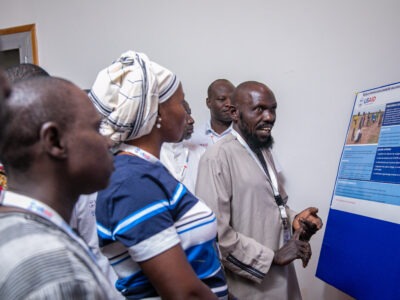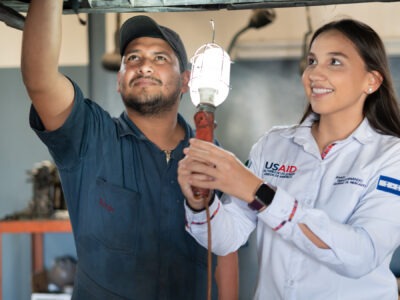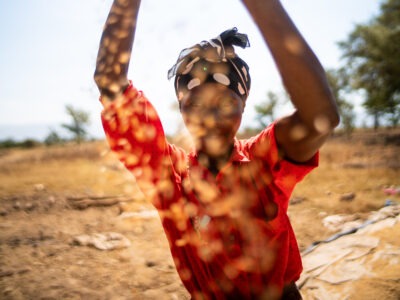
Q&A with Sergio E. Rivas (right), chief of party of the USAID Transforming Market Systems activity in Honduras
Q: Tell us about yourself.
A: I’ve worked in international development for over two decades now, and I still get energized every time I see families more empowered and with better opportunities. I started with ACDI/VOCA almost 11 years ago supervising programs in Latin America and Asia. Then I transitioned to various chief of party (COP) positions overseeing different types of projects in different settings with varying challenges.
Q: A lot of international development programs take place in environments that are unstable or transitioning. Even in stable environments, programs are always reacting to new information and circumstances. What does adaptive management mean to you?
A: As COP, good project performance relies on your proactive leadership. I equate adaptation to relevance. To me, the ability to identify early signs of disruption, to know when and how to make a side movement, and to proactively evolve to remain relevant to your goals is what adaptive management is all about.
Q: What does adaptive management look like in practice?
A: I can’t think of any of my leadership positions that haven’t required a great deal of adaptive decisions. Some are drastic, others are traumatic. But, as the philosopher Heraclitus mused, the only constant is change. For example, every project I’ve worked on has confronted host country national elections right in the middle of project implementation. The project design never factored in such major disruptions, thus we had to quickly adapt to new mentalities, approaches, and priorities without losing momentum.
I suppose the best-case scenario for adaptive management is anticipating the unexpected right before it happens; there are rare occasions when you can actually do this! However, I often resort to regrouping with my team and asking one basic question: What are we not doing? Each team member adds a different perspective, which is what makes an adaptive decision so powerful. This is how I learned the true value of diversity.
Q: How do you promote innovation and inclusion within a program?
A: I think the role of the COP is to inspire project teams. I had a sign in my office in Colombia that read “Inclusion Starts Here,” with an arrow pointing to the door. As the leading social inclusion program in Colombia, we needed to practice inclusion ourselves, so “here” meant within the program. “Here” also meant with myself, the leadership, and with each team member who walked through the door. I think the same approach applies to instilling innovation in our teams.
Q: You have led programs in Paraguay, Colombia, and now Honduras, all with varying technical approaches. How do you adapt?
A: It requires a substantial refocusing and reprograming of your existing skills as well as new learning. In Paraguay, it was a community stabilization and rapid response project. Colombia was about social inclusion, and now, in Honduras, it is a market systems approach. I personally enjoy these adaptations because they bring new challenges.
Q: What was your first impression of a market systems approach to development?
A: For me, it’s been a complete revolution. Market systems has brought to me a tsunami of new vocabulary, new planning and implementation tools, and a new way of measuring results. It is refreshing and a climactic point for international development in bringing implementation closer to truly responding to the underlying causes of social, political, and economic problems.
Q: In Honduras, how are you working to improve market systems?
A: The USAID Transforming Market Systems activity has the most concentrated emphasis on market systems I’ve seen. It permeates every aspect—from identifying the root causes of poor market performance and leverage points for change to our monitoring and evaluation plan and grants fund. Everything is focused on market systems collaboration, adaptation, learning, and co-creation, including the disposition of our offices and job descriptions.
Q: Many eyes are now on the Central America migrant crisis. How do these market systems efforts in Honduras relate to reducing migration out of the country?
A: The socioeconomic situation of many countries is increasingly uncertain and volatile. After an analytical phase, we are now sorting through the complexity of Honduras’s market systems to put together strategic action plans for transformational changes. This means addressing immediate problems, but also projecting a positive long-term economic outlook for the country. All of our action plans focus on positively affecting market stability factors that influence potential migrants. This happens through rural and urban economic opportunities that lead to jobs, especially for traditionally marginalized populations. But most importantly, we will facilitate solutions from within, originated and lead by the market actors themselves; this is reflective of our co-creative approach.
Comments





